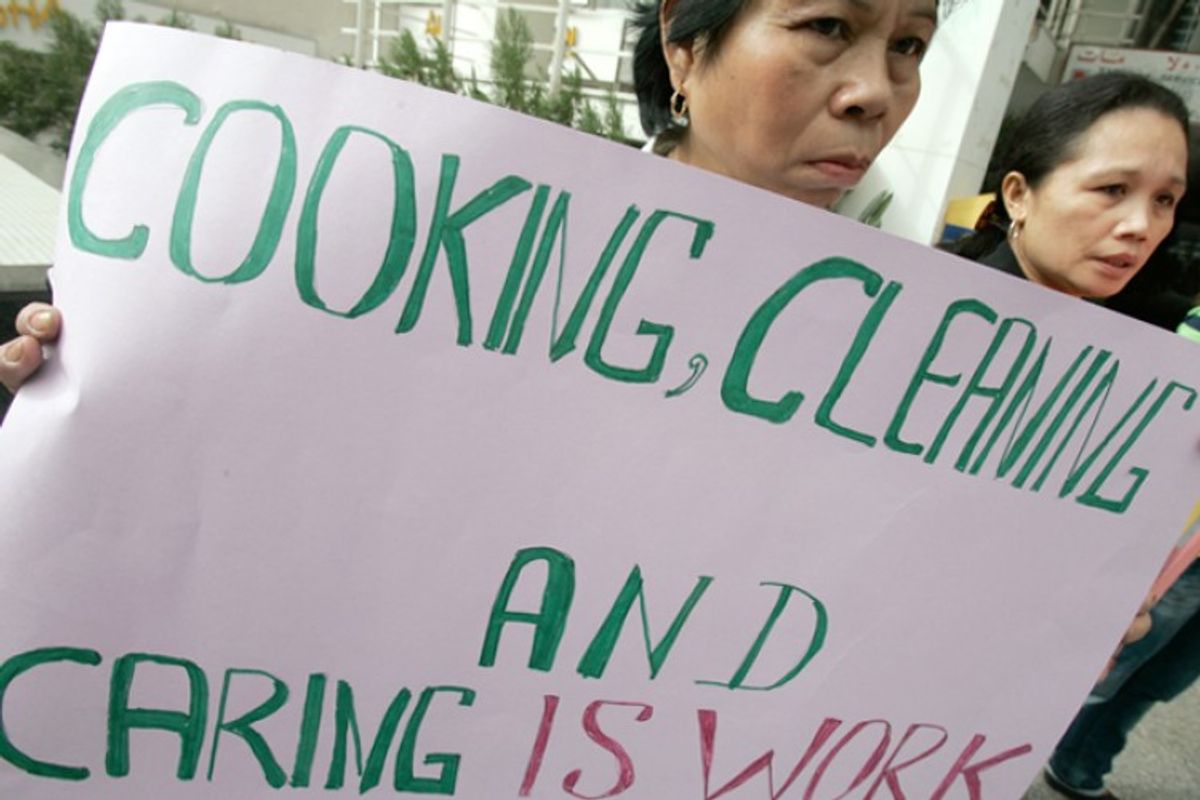Job seekers, take note: Massive opportunities in a growing sector of the economy! Perks include low pay -- often below the state minimum wage -- no retirement or pension benefits, often no health insurance, a pretty significant likelihood of stress injuries, and lack of legal protections against harm in the workplace. As a bonus, you'll be told you're "part of the family" -- though what that actually means really depends on your employer's individual generosity.
Just take your pick from being a nanny, housekeeper or elder caregiver, the jobs included in a groundbreaking new study on domestic labor released this week, which surveyed over 2,000 domestic workers from around the country (and in nine different languages). Such jobs grew almost 10 percent between 2004 and 2010, according to census data, which didn't include related categories like cooks and chauffeurs. Ninety-five percent of such workers are female; they are overwhelmingly women of color and immigrants. (An actual, grim bonus: You can't be outsourced.)
The report was spearheaded by the National Domestic Workers Alliance, which has swiftly and savvily become a powerhouse of new coalition politics, including labor, feminist and immigration groups, led by the formidable Ai-Jen Poo. Their first major victory was passing a domestic workers' rights bill in New York in 2010, though last month, California Gov. Jerry Brown handed the movement a setback by vetoing a similar bill there. Massachusetts and Illinois bills are in the works for the coming year. "Once we see measures in crucial states," said Poo at a conference Tuesday marking the release of the report, "we'll see federal movement."
That includes trying to undo the New Deal-era exclusion of domestic workers from the National Labor Relations Act, a compromise struck to placate the racism of Southern politicians whose economies depended on underpaid black labor. Domestic workers also are excluded from Occupational Safety and Health Act provisions and anti-discrimination law, despite the fact that the survey found a major racial pay gap for nearly every type of domestic worker. Meanwhile, many domestic workers are undocumented immigrants, a status the report indicates comes with significantly lower pay, another nagging reminder of the need for comprehensive immigration reform.
While the domestic labor movement seems to be doing many things right, the jobs it represents are the apotheosis of so much that's broken about our economy: Volatile, benefits-free work that also happens to be profoundly segregated by race, immigration status and gender, and ad hoc solutions to systemic problems, including the formal workplace's unchanged hostility to what is quaintly called "work life balance," leaving working households to work out arrangements for care work on their own. (The domestic workers' movement has explicitly tried to avoid demonizing employers, who after all are nearly always individual families rather than faceless corporations.)
As David Rolf, president of Local 775 Washington State, SEIU, put it at the conference, domestic workers' plight "represents the new normal -- part-time, low-wage, disaggregated temporary employment is the employment of the 21st century." In other words, domestic workers are fighting to become more like other low-wage workers at a time when those workers' lives are more precarious than ever.
Another panelist, economist Jared Bernstein, said he'd just pondered what all this had to do with the so-called fiscal cliff. The answer was: lots. "The spending cuts that are invoked, which conservatives really want to cut in order to make the numbers work, directly impinge upon the agencies whose responsibilities are to enforce the kinds of laws we're fighting for here," he said, including Labor Department jobs. "You can have all the rules in the world but if they're not implemented by enforcers, they're all for naught."
The labor movement, and many feminists, have also noticed that nannies, housekeepers and elder caregivers (mostly women of color) are being paid very little to do nearly invisible, intimate work in the home that many women perform unpaid. As the DWU report notes, "Women's massive entry into the labor force over the past several decades has not been accompanied by generous public policies related to maternity leave, family leave, child care, elder care, or care for people with disabilities."
This is an intergenerational problem, as domestic workers struggle to care for their own families with what they make caring for other people's. Another report released this week by sociologists Lisa Dodson and Randy Abelda looks at the negative impact of low-wage jobs on the children of such workers, who often end up becoming caregivers themselves of younger siblings.
The report explicitly points to welfare reform having pushed single mothers into the workforce -- and into inflexible, unpredictable low-wage jobs with limited social or professional mobility. As Dodson told the New York Times, “Policymakers tend to put things into what we call ‘silos.' Jobs here. Kids there. Instead, we need to look at the ways these things affect each other. The structure of low-wage jobs creates a particular kind of obstacle for parents trying to take good care of their kids.”
Whether it's about taking care of their own kids or others', or both at the same time, this is all incredibly short-sighted, both in terms of investment in future generations and care for a rapidly aging population. But DWU and its allies do provide plenty of reason for optimism. In addition to their lobbying and organizing, they're talking about new ideas, like partnering with green cleaning companies to provide less hazardous products to housecleaners and brainstorming about a website to match employers who want to do the right thing with potential domestic workers.
And they've come far enough to build some consensus around recognizing domestic labor as real work and the home as a literal economy. Next stop: fortifying that economy with good and safe jobs.

Shares